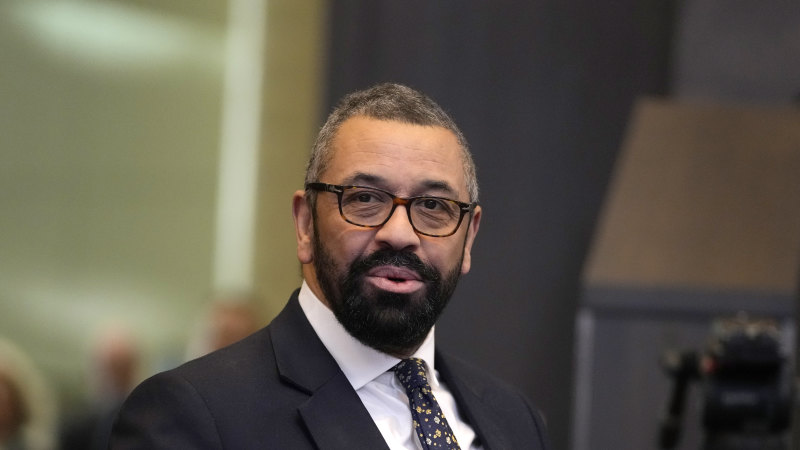Save articles for later
Add articles to your saved list and come back to them any time.
Manchester: What happens in the Taiwan Strait is everybody’s business.
That’s the view of James Cleverly, British Foreign Secretary, who said any conflict over Taiwan would collapse China’s economy and take other countries with it.
Cleverly, who comes under sharp criticism from hawkish Conservative MPs for being too dovish on China, said that if Xi Jinping were to take over the island, as the Chinese president has threatened, that would constitute a “massive failure of foreign policy”.
British Foreign Secretary James Cleverly said “disruption across the Taiwan Strait is everybody’s business”.Credit: AP
“I have said this multiple times and directly to the Chinese government, disruption across the Taiwan Strait is everybody’s business,” Cleverly told an event on the sidelines of the Conservative Party conference under way in Manchester.
“It would be a catastrophically bad thing for the global economy, and it would be a catastrophically bad thing for the Chinese economy.
“Conflict across the Taiwan Strait would, I think, collapse the Chinese economy and bring a number of other economies with it,” he said.
Cleverly added that China’s economic slowdown was showing the world that it was not “all-powerful” and that it was not a given that it would supersede the United States to become the world’s dominant economy.
China, Australia’s largest trading partner, buys around one-third of Australia’s total exports, driven by iron ore and more recently lithium which is used to make batteries for electric cars and other devices. By comparison, China is Britain’s fifth-largest trading partner.
Cleverly said Britain was now placing a “greater priority” on security and protection above its commercial relationship with Beijing.
However, when asked by this masthead if the UK was pursuing a strategy of de-risking, Cleverly did not identify any parts of the UK economy that the government was actively seeking to protect.
The term “de-risking” was first coined by the EU Commission President Ursula von der Leyen and has been subsequently adopted by the G7, White House and Australia. Some countries like Japan have identified specific sectors, including semiconductors and pharmaceuticals, that warrant specific protection from dependence on China.
But Cleverly said: “De-risking doesn’t just have to happen in a bilateral relationship.
“It’s in everyone’s interests to diversify.”
He said African countries processing their own critical minerals, instead of selling them raw to China, could help stop the flow of migrant boats to the UK, via Europe.
“It also helps us to stop the boats, because guess what, if we can lift those African economies, poor Africans are going to be less desirous to try and cross the Mediterranean and cross the Channel to try and come to the UK,” he said.
“So it’s a kind of win-win.”
Delegates at the Conservative party conference in Manchester, England. Credit: Getty
Speaking earlier, Cleverly’s cabinet colleague, Grant Shapps, who was appointed defence secretary a month ago, said Britain remained committed to the Indo-Pacific through the Australian-UK-US alliance (AUKUS), even as it further ramped up its aid to Ukraine.
Shapps this week allocated BAE Systems £4 billion ($7.6 billion) to begin designing the SSN AUKUS submarine that is intended to be built in both Barrow, England and Adelaide in South Australia.
He drew a direct line between US support for Ukraine and the protection of Taiwan from Chinese aggression when asked about the risks for Ukraine if Donald Trump was re-elected US president.
Trump has previously stated he wants to see Russia and Ukraine stop fighting and cut a deal, but that would likely involve forcing Ukraine to cede territory violating the terms for peace set out by President Volodymyr Zelensky.
Shapps said it was not “entirely clear” what Trump would do if victorious in ousting Biden from the White House.
“One thing we do know about Trump is that he has a big issue with China and he’s also concerned about Taiwan,” Shapps said.
“You don’t want to accidentally send a wrong message to China that force is okay to use so no, I don’t think the worst-case scenario is Trump.”
Get a note directly from our foreign correspondents on what’s making headlines around the world. Sign up for the weekly What in the World newsletter here.
Most Viewed in World
From our partners
Source: Read Full Article


